
8 Steps to Make an Effective Digital Marketing Plan
Mar 12, 2025 5 Min Read 7596 Views
(Last Updated)
A strategic digital marketing plan can familiarize you with new definitions of success. You and your team work through various campaigns and content creation processes. Having a plan ensures you do it well.
Whether you’re just starting or have an established business, understanding the components of an effective digital marketing plan benefits you in improving the performance of your campaigns.
This blog sheds light on the eight important steps to making an effective digital marketing plan that aligns with your business objectives and positions your brand for growth and engagement in the coming years.
Table of contents
- Understanding the Importance of an Effective Marketing Plan
- 8 Steps to Building an Effective Digital Marketing Plan
- Define your digital marketing goals
- Understand your online audience
- Ingrain the core values of your business
- Analyze your competitors
- Develop a content marketing strategy
- Use the right digital marketing channels
- Implement and optimize digital marketing campaigns
- Allocate budget and resources
- Final Words
- What is the first step in creating a digital marketing plan?
- How often should I review my marketing plan?
- Can small businesses benefit from a digital marketing plan?
- What's a common mistake to avoid in creating an effective marketing plan?
- How do you measure the success of a digital marketing plan?
Understanding the Importance of an Effective Marketing Plan

Making an effective digital marketing plan prioritizes your company’s core objectives while being in tandem with its broader business goals. Besides ensuring online visibility, meaningful engagement through lead conversions on various digital platforms can build trust and brand loyalty for your business like never before.
What this means is that every digital initiative, from social media campaigns to SEO efforts, should be purpose-driven and measurable for an effective digital marketing plan to take shape. This alignment ensures hitting all the right roads to take your business forward coherently and cohesively, ultimately driving online success and contributing to your business’s overall growth.
Enrolling in GUVI’s Digital Marketing course can help you become an expert in the digital world, regardless of your level of marketing expertise. Learn the ins and outs of email marketing, social media marketing, content production, SEO, and more from professionals in the field. Through practical projects and real-world case studies, acquire job-ready skills with globally recognized certifications. Additionally, if you want to explore Marketing Research Techniques through a Self-paced course, try GUVI’s Marketing Research Techniques certification course.
Learn More About What is Digital Marketing? Complete Beginner’s Guide
8 Steps to Building an Effective Digital Marketing Plan

Building a comprehensive digital marketing plan involves a structured approach that begins with setting clear objectives and understanding the digital landscape. It requires an in-depth analysis of target audiences, identifying the most effective digital channels, and developing content that resonates. A successful plan also hinges on continuous testing, measurement, and optimization to ensure strategies remain effective over time. This allows for flexibility, enabling businesses to adapt to changing market dynamics and consumer behaviors, ensuring long-term digital success.
For example, a digital marketing plan might start with the goal of increasing website traffic by 20% within six months, using a combination of SEO strategies and content marketing. It could outline specific tactics like optimizing key landing pages for search engines and launching a monthly blog series addressing customer pain points. Regular A/B testing of email marketing campaigns to improve open rates and conversions could be another facet.
These examples illustrate how a structured approach, combined with specific, actionable tactics, can bring an effective digital marketing plan to life.
Let’s further understand the key areas of a digital marketing plan that will help you get started.
1. Define your digital marketing goals
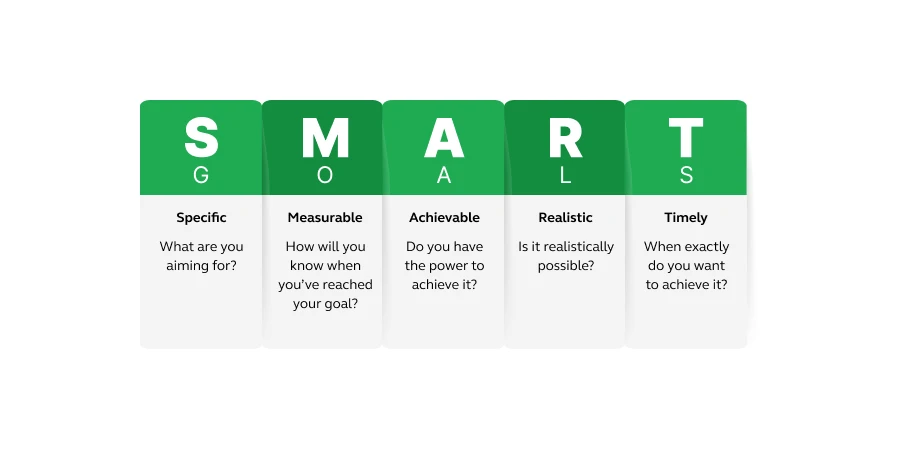
Defining clear digital marketing objectives is crucial in making an effective marketing plan. Setting goals that are Specific, Measurable, Achievable, Relevant, and Time-bound (SMART) ensures that your digital marketing efforts are guided by precision and purpose.
For example, instead of increasing your online presence, a SMART objective would be to increase your website traffic by 30% within the next quarter through targeted social media campaigns. Such clarity allows for focused strategies and measurable outcomes, making it easier to track progress and adjust tactics as needed.
2. Understand your online audience
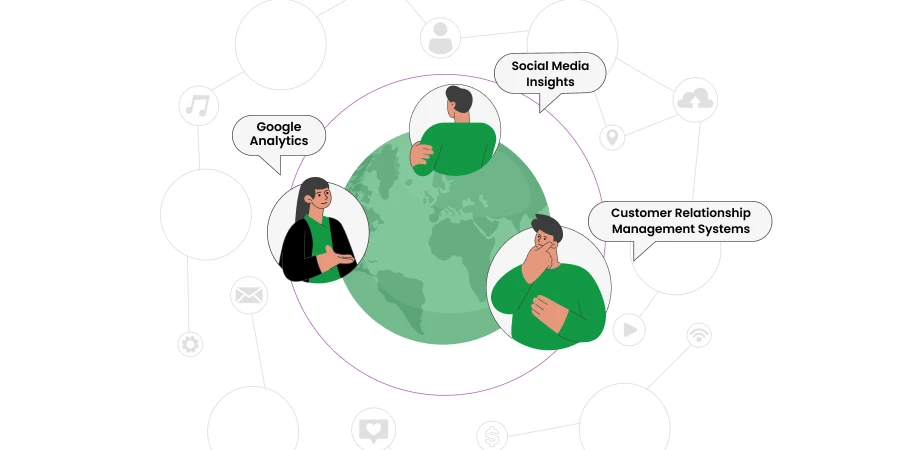
Understanding your online audience is critical in making an effective marketing plan. Audience analysis and segmentation allow you to tailor your digital marketing efforts to meet the specific needs and preferences of different groups within your target market.
You can create more personalized and impactful marketing messages by dissecting your audience based on demographics, interests, and online behaviors. For example, using analytics to segment your audience by age or location can help design campaigns that resonate more deeply with each group, enhancing engagement and conversion rates.
You can also use tools such as Google Analytics, social media insights, and customer relationship management (CRM) systems to provide valuable data on how users interact with your online content, what they are searching for, and which channels they prefer.
Must Read: Roles and Responsibilities of Digital Marketers
3. Ingrain the core values of your business

Aligning your digital marketing strategies with your company’s core mission and values also helps make an effective marketing plan. This alignment ensures that every piece of content, every campaign, and every interaction online reflects what your brand stands for, creating a consistent and authentic brand experience across all digital platforms.
When your marketing messages resonate with your business’s core values, they connect more deeply with your audience, fostering trust and loyalty. For example, if sustainability is a core value of your business, incorporating eco-friendly practices and messages into your digital marketing can attract like-minded consumers and strengthen your brand’s identity.
This strategic alignment reinforces your brand’s identity and enhances online engagement. Customers today also look for brands that share their values and beliefs, more than just products or services. By ingraining your business’s core values into your digital marketing efforts, you create opportunities for meaningful interactions and engagement.
Also Explore: Top 15 B2B Digital Marketing Strategies [Updated]
4. Analyze your competitors
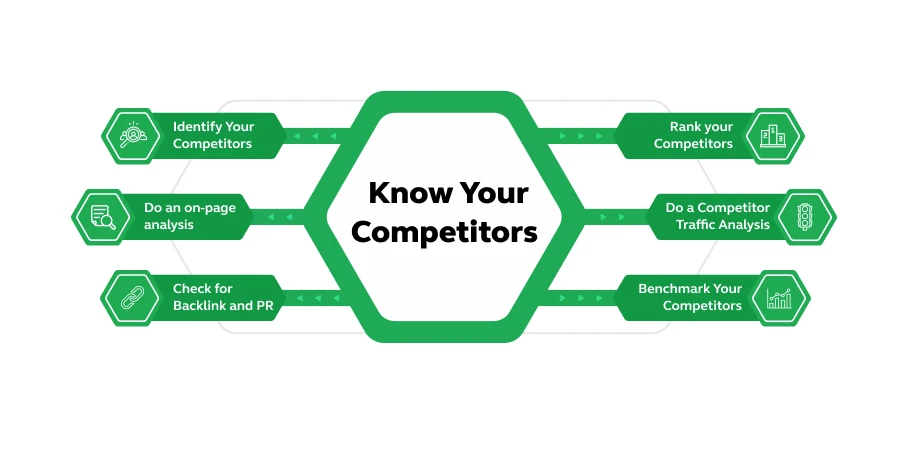
Understanding where your business stands relative to your competitors helps open unique opportunities and areas for improvement. A thorough competitive analysis examines your competitors’ online presence, including their website, social media activity, search engine optimization (SEO) strategies, and online advertising efforts.
Doing so helps identify what works well in your industry and where there might be gaps that your business can capitalize on to offer a competitive edge. Incorporating a SWOT analysis (Strengths, Weaknesses, Opportunities, Threats) into your strategy further refines your marketing plan.
You can create a more nuanced and effective strategy by assessing your business’s strengths and weaknesses in the digital environment and identifying the opportunities and threats posed by your competitors.
Must Know: Best Way to Learn Digital Marketing
5. Develop a content marketing strategy
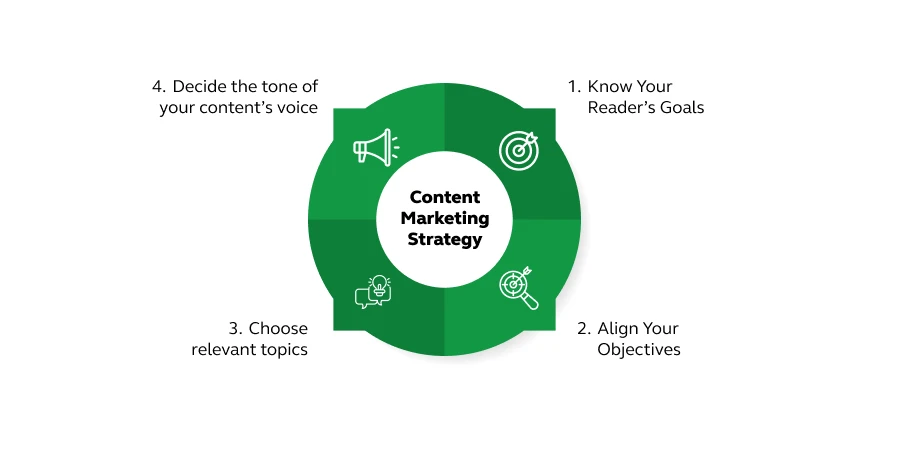
Developing a content marketing strategy is also crucial in an effective marketing plan. Content is the linchpin that connects your brand to your audience, engaging them with valuable information and nurturing their journey from awareness to decision-making. A well-crafted content strategy helps inform, entertain, and establish your brand as an authority in your field, fostering trust and loyalty among your audience.
The right content greatly enhances your online presence and engagement, be it through informative blog posts, engaging social media content, insightful videos, or compelling infographics.
Creating a content calendar is a fantastic way to organize and execute your content strategy. This calendar is a roadmap for what content will be published and when, ensuring a consistent and coherent content flow that aligns with key dates, events, and business objectives. It helps maintain a regular posting schedule, accommodating strategic planning around peak periods for your industry and ensuring your content has the maximum impact.
Also Find Out Top 9 AI Tools for Content Creation That You Shouldn’t Miss
6. Use the right digital marketing channels
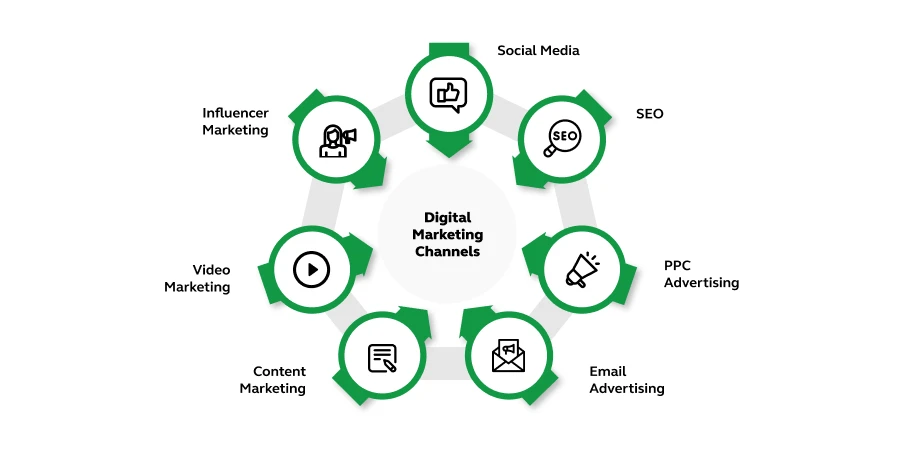
Each channel, whether it’s Search Engine Optimization (SEO), Pay-Per-Click (PPC) advertising, Social Media, or Email Marketing, serves a unique purpose and reaches audiences in different stages of the customer journey.
SEO is foundational for driving organic traffic to your website and enhancing visibility and credibility. On the other hand, PPC offers a quick boost in visibility and targeted traffic, making it ideal for specific campaigns or promotions.
Social media platforms are invaluable for building brand awareness, engaging with your audience, and driving traffic to your site. At the same time, email marketing remains one of the most effective channels for direct communication, nurturing leads, and retaining customers.
Selecting and prioritizing these channels should be based on a deep understanding of your target audience and specific marketing objectives. For example, focusing on visual and dynamic platforms like Instagram and TikTok might be more beneficial if your goal is to increase brand awareness among a younger demographic.
Conversely, LinkedIn and email marketing could be more appropriate if your objective is to generate leads for a B2B service. This strategic selection ensures that your efforts are concentrated where they will have the most impact, optimizing resource allocation and maximizing ROI (return on investment).
7. Implement and optimize digital marketing campaigns

The execution of digital marketing campaigns involves careful planning, coordination across different channels, and meticulous attention to detail. Once a campaign is live, the real work begins with continuous testing and optimization. This iterative process allows marketers to refine their strategies based on real-world data, improving the effectiveness of their campaigns over time.
For example, A/B testing different email subject lines or landing page designs can provide valuable findings into what resonates best with your audience, enabling you to make informed adjustments that enhance engagement and conversion rates.
The role of analytics in this process cannot be overstated. Utilizing tools like Google Analytics, Facebook Insights, or specialized software gives you proper insights into campaign performance and tracking metrics such as click-through rates, engagement levels, and conversion rates.
These analytics provide a clear picture of how well each campaign achieves its objectives and where there may be room for improvement. By closely monitoring these metrics, you can identify trends, pinpoint successful elements, and recognize areas needing refinement.
Also Explore: Optimizing Website Performance: 9 Strategies for Faster Loading User Interfaces
8. Allocate budget and resources

Careful planning of budgets involves setting aside funds for each digital channel and considering the cost of creative development, software tools, and human resources. Efficient allocation means prioritizing spending on channels and tactics that offer the highest return on investment (ROI), which requires a deep understanding of past performance and an educated projection of future outcomes.
For example, suppose SEO and content marketing have historically driven significant traffic and conversions at a lower cost than paid advertising. In that case, allocating a more substantial portion of the budget to these areas might be tactful.
Flexibility in budgeting is equally important. Market trends, consumer behaviors, and campaign performance can all change rapidly, calling for adjustments to your marketing strategy and budget allocation.
Must Read About Top Digital Marketing Trends
Join GUVI’s Digital Marketing Course to kickstart your journey in this exciting field. Gain expertise in ChatGPT, WordPress, Meta Business Suite, Google Analytics, Youtube Analytics, Google Ads Manager, and more. Master essential skills in SEO, social media marketing, email marketing, content creation, and digital advertising tactics to excel in the Digital Marketing industry. Additionally, if you want to explore Marketing Research Techniques through a Self-paced course, try GUVI’s Marketing Research Techniques certification course.
Final Words
Creating an effective marketing plan is a one-time blueprint that evolves with digital trends, technological advancements, and the growth of your business. It helps you anticipate changes in customer behavior and adapt to new platforms and tools, aligning with your company’s evolving objectives.
Consider the ways mentioned above to create your own marketing plan and ensure the growth and success of your business. You can also read about the importance of brand storytelling in the digital age to elevate your business.
The first step is conducting a market analysis to understand your industry, your target audience, and your competitors.
You should review and update your digital marketing plan at least every quarter to adapt to market changes and campaign performance.
Yes, digital marketing plans are scalable and can be tailored to fit the resources and goals of small businesses effectively.
You should avoid not setting clear, measurable goals, which can lead to unfocused efforts and unclear outcomes.
Measure the success of your digital marketing plan by tracking key performance indicators (KPIs) like website traffic, conversion rates, and ROI aligned with your objectives.





















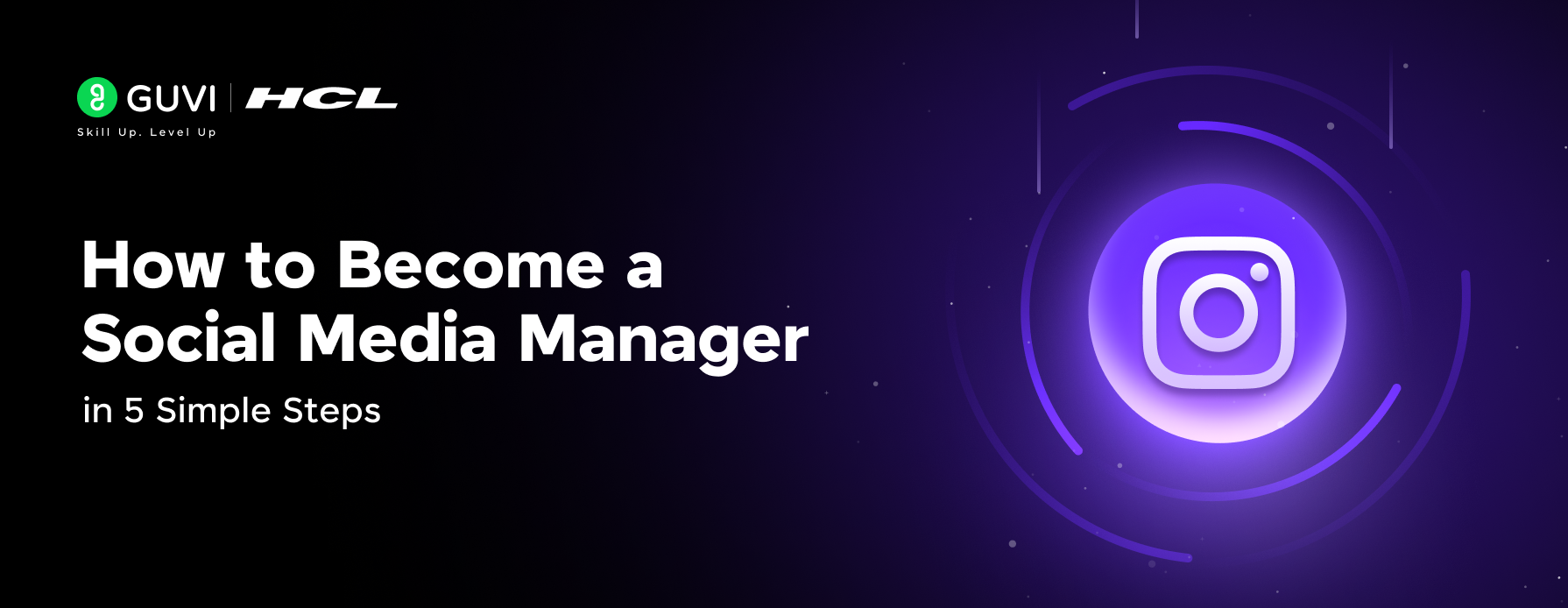
![How to Switch from Sales to Digital Marketing: A Beginner's Guide [2025] 14 sales to digital marketing](https://www.guvi.in/blog/wp-content/uploads/2025/01/How-to-switch-your-career-from-Sales-to-Digital-Marketing.png)
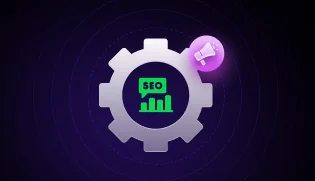






Did you enjoy this article?